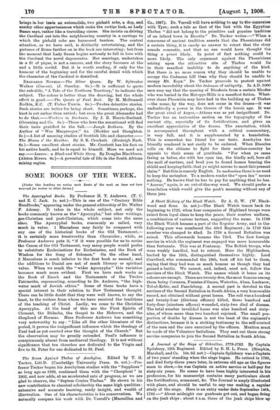SOME BOOKS OF THE WEEK.
[Under this heading we notice such Books of the week as have not been reserved for review in other forms.]
The Apocryphal Books. By Professor H. T. Andrews. (T. C. and E. C. Jack. ls. net.)—This is one of the "Century Bible Handbooks," appearing under the general editorship of Dr. Walter F. Adeney. It takes in the whole subject, not only the books commonly known as the "Apocrypha," but other writings, pre-Christian and post-Christian, which come into the same class. The Apocryphal books, commonly so called, vary much in value. 1 Maccabees may fairly be compared with any one of the historical books of the Old Testament,— it is certainly more trustworthy than Chronicles ; while, as Professor Andrews puts it, "if it were possible for ns to revise the Canon of the Old Testament, very many people would prefer to substitute Ecelesiesticus for Ecclesiastes, and the Book of Wisdom for the Song of Solomon." On the other hand, 2 Maccabees is much inferior to the first book so named; and the additions to Daniel are not of much literary or spiritual value. When wo reach the "wider Apocrypha" this variation becomes much more evident. First we have such works as the Book of Enoch and the Testaments of the Twelve Patriarchs, representing, according to Dr. Andrews, "the high- water mark of Jewish ethics." Some of these books have a special interest in their relation to New Testament thought. There can be little doubt that they were well known, to say the least, to the writers from whom we have received the traditions of the teaching of Christ. Lastly, we come to the Christian Apocrypha. At the head of this are the First Epistle of Clement, the Didache, the Gospel to the Hebrews, and the Shepherd of Hennas. Here Professor A.ndrews has something very noteworthy to say " Like all the other literature of the period, it proves the insignificant influence which the theology of Paul had as yet exerted over the thought of the Church." But the observation may be greatly extended. Paul's influence is conspicuously absent from mediaeval theology. It is not without significance that ten churches are dedicated to the Virgin and five to St. Peter for one dedicated to St. Paul.


































 Previous page
Previous page